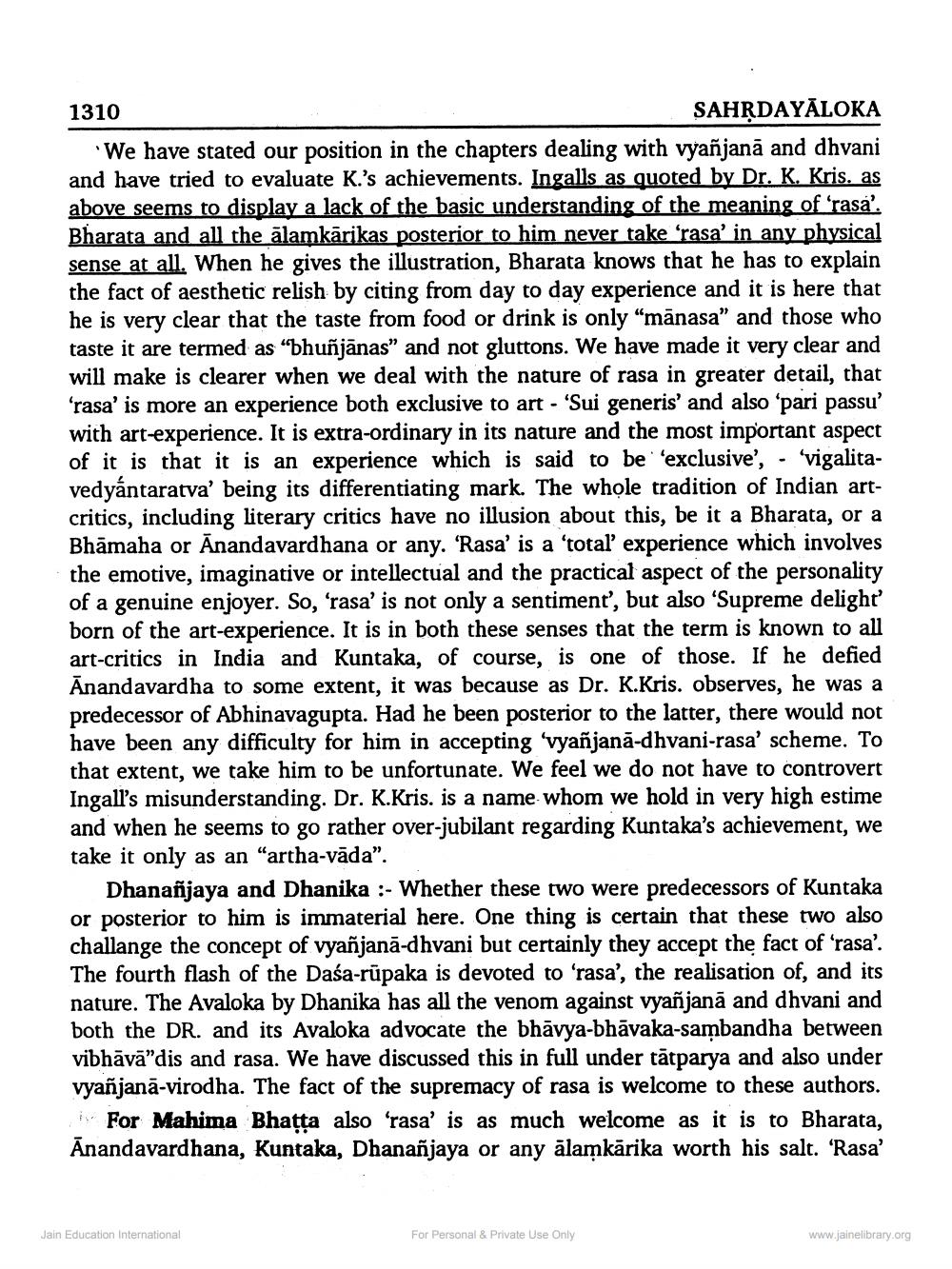________________
1310
SAHRDAYĀLOKA We have stated our position in the chapters dealing with vyañjanā and dhvani and have tried to evaluate K.'s achievements. Ingalls as quoted by Dr. K. Kris. as above seems to display a lack of the basic understanding of the meaning of 'rasa'. Bharata and all the ālamkārikas posterior to him never take 'rasa' in any physical sense at all. When he gives the illustration, Bharata knows that he has to explain the fact of aesthetic relish by citing from day to day experience and it is here that he is very clear that the taste from food or drink is only “mānasa" and those who taste it are termed as “bhuñjānas” and not gluttons. We have made it very clear and will make is clearer when we deal with the nature of rasa in greater detail, that
is more an experience both exclusive to art - 'Sui generis' and also 'pari passu with art-experience. It is extra-ordinary in its nature and the most important aspect of it is that it is an experience which is said to be exclusive', - 'vigalitavedyantaratva' being its differentiating mark. The whole tradition of Indian artcritics, including literary critics have no illusion about this, be it a Bharata, or a Bhāmaha or Anandavardhana or any. 'Rasa' is a 'total experience which involves the emotive, imaginative or intellectual and the practical aspect of the personality of a genuine enjoyer. So, 'rasa' is not only a sentiment', but also 'Supreme delight born of the art-experience. It is in both these senses that the term is known to all art-critics in India and Kuntaka, of course, is one of those. If he defied Anandavardha to some extent, it was because as Dr. K.Kris. observes, he was a predecessor of Abhinavagupta. Had he been posterior to the latter, there would not have been any difficulty for him in accepting 'vyañjanā-dhvani-rasa' scheme. To that extent, we take him to be unfortunate. We feel we do not have to controvert Ingalls misunderstanding. Dr. K.Kris. is a name whom we hold in very high estime and when he seems to go rather over-jubilant regarding Kuntaka's achievement, we take it only as an “artha-vāda”.
Dhananjaya and Dhanika :- Whether these two were predecessors of Kuntaka or posterior to him is immaterial here. One thing is certain that these two also challange the concept of vyañjanā-dhvani but certainly they accept the fact of 'rasa'. The fourth flash of the Daśa-rupaka is devoted to 'rasa', the realisation of, and its nature. The Avaloka by Dhanika has all the venom against vyañjanā and dhvani and both the DR. and its Avaloka advocate the bhāvya-bhāvaka-sambandha between vibhāvā"dis and rasa. We have discussed this in full under tātparya and also under vyañjanā-virodha. The fact of the supremacy of rasa is welcome to these authors. # For Mahima Bhatta also 'rasa' is as much welcome as it is to Bharata Anandavardhana, Kuntaka, Dhananjaya or any alamkārika worth his salt. 'Rasa'
Jain Education International
For Personal & Private Use Only
www.jainelibrary.org




